Oceania
The Eighth Pacific Islands Leaders Meeting(PALM8)(Overview of Results)
May 19, 2018
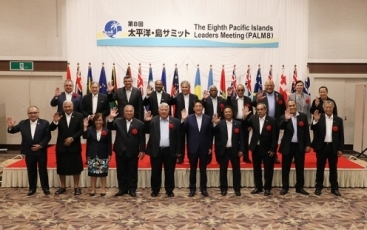 Photo: Cabinet Public Relations Office
Photo: Cabinet Public Relations Office
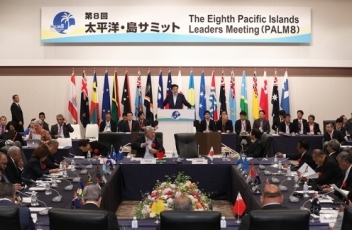 Photo: Cabinet Public Relations Office
Photo: Cabinet Public Relations Office
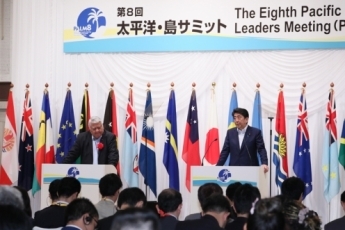 Photo: Cabinet Public Relations Office
Photo: Cabinet Public Relations Office
1 Key Points
(1) The Eighth Pacific Islands Leaders Meeting (PALM8) was held with Prime Minister Abe and Prime Minister Tuilaepa of Samoa as the co-chairs in Iwaki, Fukushima, Japan on 18 and 19 May 2018at Spa Resort Hawaiians. PALM8 was held under the theme "We are Islanders - Partnership Towards Prosperous, Free and Open Pacific" and leaders participated from 19 countries and regions including Japan, 14 island countries, New Zealand, and Australia, and in addition, the two regions of New Caledonia and French Polynesia which participated for the first time.
(2) At PALM8, discussions were conducted centered on the four agenda items of (i) a maritime order based on the rule of law, and sustainable oceans, (ii) resilient and sustainable development, (iii) connecting Pacific citizens, and (iv) cooperation in the international arena. The PALM8 Leaders' Declaration was adopted as the outcome of the discussions (Summary).
(3) The key points of PALM8 were the following four points.
(2) At PALM8, discussions were conducted centered on the four agenda items of (i) a maritime order based on the rule of law, and sustainable oceans, (ii) resilient and sustainable development, (iii) connecting Pacific citizens, and (iv) cooperation in the international arena. The PALM8 Leaders' Declaration was adopted as the outcome of the discussions (Summary).
(3) The key points of PALM8 were the following four points.
- Japan declared its intention to commit more deeply to the stability and prosperity of the region based on the "Free and Open Indo-Pacific Strategy" and the Pacific island countries shared the importance of the basic principles of the strategy and welcomed the strengthening of Japan's commitment in the Pacific region under the strategy.
- Taking into account the "Free and Open Indo-Pacific Strategy," the participants discussed free and open and sustainable oceans as the most important agenda item of PALM8, shared their recognition regarding the importance of the rule of law in the seas, and agreed to promote cooperation in areas such as support for capacity building in the area of maritime security, including maritime law enforcement, development of ports and harbors, etc.
- In-depth discussions about cooperation in the international arena were held, and a statement regarding the North Korea issue was incorporated in the PALM Leaders' Declaration for the first time. Furthermore, support for Japan's bid for permanent membership in the United Nations Security Council was expressed.
- Japan pledged to implement thorough development cooperation of the same kind as previously over the next three years while taking into account achievements to date, and declared that it would implement cooperation for human resource development and people-to-people exchanges for more than 5,000 people over the next three years based on the recognition that the basis for growth and prosperity is human resources development. As a part of that, Japan declared regarding cooperation for "free and open and sustainable oceans," which is a particularly important pillar of the present cooperation, that it would conduct human resources development and people-to-people exchanges for 500 people over the next three years.
2 Overview of Each Session
(1) Opening
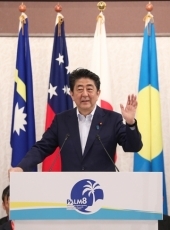 Photo: Cabinet Public Relations Office
Photo: Cabinet Public Relations Office
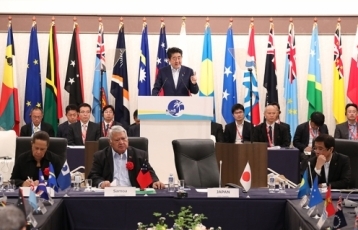 Photo: Cabinet Public Relations Office
Photo: Cabinet Public Relations Office
Prime Minister Abe gave a keynote speech about Japan's diplomacy with respect to the Pacific island countries, which is focused on the ocean.
Prime Minister Abe stated that the fourth Ministerial Interim Meeting would be held in approximately 18 months in order to follow-up on the outcomes of PALM8 appropriately and discuss the direction of policies for PALM 9. Furthermore, Prime Minister Abe stated that he intended to pursue the possibility of holding the Ministerial Interim Meeting in a Pacific island country, and stated that he intended to maintain and strengthen dialogue at the leader level. Finally Prime Minister Abe reaffirmed his determination for Japan and the Pacific island countries to build a partnership together for a new era based on the PALM8 Leaders' Declaration and ensure a prosperous, free and open Pacific together, and then he declared the Eighth Pacific Islands Leaders Meeting closed.
(2) First Session (PALM Process and the Partnership between Japan and the Pacific Island Countries)
- Prime Minister Abe explained that the commitments pledged at PALM7 had been achieved in a form that greatly surpassed the goals, and then declared that Japan pledged to advance cooperation centered on the three areas of (i) free and open and sustainable oceans, (ii) sustainable development, and (iii) connecting Pacific citizens over the next three years, and that the Government of Japan would listen carefully to the needs of the Pacific island countries while providing meticulous, high-quality support both on the tangible and intangible fronts that will truly benefit the people of the island countries and their society, and implement human resource development and people-to-people exchanges for more than 5,000 people centered on these areas over the next three years.
- The Pacific island countries stated that they highly evaluated the role that the PALM has played to date, and Japan and the Pacific island countries agreed to further strengthen the PALM process. Furthermore, the Pacific island countries expressed gratitude for the contribution of Japan over many years, and expressed strong support for new cooperation and assistance measures for the next three years.
(3) Second Session (Maritime Order based on the Rule of Law, and Sustainability of Ocean Resources)
- Prime Minister Abe declared that Japan would strengthen its commitment in the Pacific island countries region based on the "Free and Open Indo-Pacific Strategy" and would actively implement a range of cooperation including ODA, and called on the Pacific island countries to engage in collaboration and cooperation. In response, each of the countries made many declarations to the effect that they supported the principles advocated by this strategy and welcomed Japan's active and constructive contribution to the region based on this strategy. In addition, each country stated its expectations for the implementation of this strategy.
- Japan and the Pacific island countries agreed regarding the importance of making the concept of the rule of law deeply rooted in the Pacific, and to work together on the appropriate management of fishing resources, including measures to combat illegal, unreported and unregulated (IUU) fishing. Furthermore, Prime Minister Abe lobbied for cooperation to ensure that Japanese fishing vessels could engage in stable operations in the region.
- Prime Minister Abe declared that Japan would advance comprehensive initiatives with respect to maritime issues with the areas that it particularly wants to focus on going forward being (i) measures to combat illegal fishing through human resources development and equipment provision and improvement of capacity in the area of maritime security, including maritime law enforcement, (ii) management of living marine resources, including cetaceans, and preservation of the marine environment, and (iii) strengthening of maritime connectivity with development of a maritime transport network through development of ports and harbors, etc. He also declared that Japan would implement capacity-building measures for 500 people over the next three years, and strong expectations were expressed by each country.
(4) Third Session (Strengthening the Basis for Resilient and Sustainable Development)
- Prime Minister Abe explained that for Japan the realization of resilient and sustainable development was a priority cooperation area, and then confirmed collaboration toward achievement of the sustainable development goals (SDGs) and regarding climate change, a serious issue that threatens the very survival of the Pacific island countries, he declared support through capacity-building of administrative officials through development of the Pacific Climate Change Centre and further introduction of and efficient utilization, etc. of renewable energy. The Pacific island countries made a statement regarding the importance of strengthening international collaboration for measures to combat climate change, and expressed strong expectations regarding further cooperation by Japan in this area.
- Regarding disaster risk reduction, Prime Minister Abe declared his solidarity with people who had suffered harm due to the various natural disasters that had afflicted the region, and then declared that going forward Japan would provide as much support as possible, including for strengthening the resilience of the Pacific island countries with respect to natural disasters. Furthermore, he mentioned responding to environment issues through initiatives for waste reduction, etc. and cooperation in the public health and education areas. In response, the Pacific island countries declared their gratitude for the many years of support by Japan, and agreed that going forward Japan and the Pacific island countries would collaborate closely in order to increase the resilience of each country.
- Prime Minister Abe stated regarding infrastructure development in the region that it was important that sovereignty and peaceful use be respected and that infrastructure development be advanced in accordance with international standards such as openness, transparency, economic efficiency of infrastructure, and financial viability of recipient countries, etc. and declared that Japan would advance support for development of quality infrastructure in accordance with these kinds of international standards. In response, each country made requests for further infrastructure development by Japan.
(5) Working Lunch: Agenda Item 1 (Connecting Pacific Citizens)
- Prime Minister Abe explained about initiatives including relaxation of visa requirements, exchanges of local governments with the Pacific island countries, increasing the number of flights between Japan and the Pacific island countries, revitalization of Japanese language education in the Pacific island countries, cooperation through JENESYS and Pacific-LEADS in the people-to-people exchanges area, etc.Furthermore, Prime Minister Abe expressed gratitude for the cooperation of the Pacific island countries regarding the repatriation of remains of the war dead from World War II and building and maintenance of government-built monuments for the war dead, and lobbied them for continued cooperation.
- The Pacific island countries made a statement pointing out the importance of revitalizing the moves to strengthen people-to-people exchanges and connections with Japan and declared their strong expectations regarding further connecting Pacific citizens, including the establishment of direct flights, human resources development, further relaxation of visa requirements, etc., and Japan and the Pacific island countries agreed to continue to cooperate closely in this area.
(6) Working Lunch: Agenda Item 2 (Cooperation in the International Arena)
- Prime Minister Abe stated that Japan would make the maximum possible contribution for the success of initiatives led by the Pacific island countries, and then expressed gratitude for the consistent strong support from Pacific island countries for Japan's bid for permanent membership in the United Nations Security Council and support for Japan in a range of international elections. In response, the Pacific island countries stated that they would continue to strongly support Japan in the international arena, in particular Japan's bid for permanent membership in the United Nations Security Council. Furthermore, they requested support from Japan for the range of initiatives hosted and led by the Pacific island countries.
- Regarding the North Korea situation, the leaders of each country, including Prime Minister Abe, welcomed the "Panmunjeom Declaration for Peace, Prosperity and Unification of the Korean Peninsula" which confirmed the shared goal of complete denuclearization of the Korean Peninsula agreed in the Inter-Korean Summit in late April, and declared their expectation that North Korea would demonstrate concrete actions toward this goal through the upcoming US-North Korea Summit Meeting in June. Furthermore, they strongly urged North Korea to immediately take concrete actions in accordance with United Nations Security Council resolutions, and agreed to continue to apply pressure on North Korea, including full implementation and enforcement of the United Nations Security Council resolutions. In particular, they declared their deep concerns about North Korea's sanctions evading tactics including "ship-to-ship transfer", and emphasized the need to accelerate their own efforts in accordance with the relevant United Nations Security Council resolutions, including by deregistering North Korean trading or fishing vessels currently flagged on their shipping registers. Moreover, they stressed the importance of seeking a peaceful and diplomatic resolution towards complete, verifiable and irreversible dismantlement of all weapons of mass destruction, including biological and chemical weapons, ballistic missiles of all ranges, and the related facilities of North Korea and the importance of addressing the humanitarian concerns related to North Korea, including the immediate resolution of the abductions issue.
(7) Closing
Samoa expressed gratitude to each country, in particular Japan, for the success of PALM8, and stated that it intended to further strengthen the partnership between Japan and the Pacific island countries.Prime Minister Abe stated that the fourth Ministerial Interim Meeting would be held in approximately 18 months in order to follow-up on the outcomes of PALM8 appropriately and discuss the direction of policies for PALM 9. Furthermore, Prime Minister Abe stated that he intended to pursue the possibility of holding the Ministerial Interim Meeting in a Pacific island country, and stated that he intended to maintain and strengthen dialogue at the leader level. Finally Prime Minister Abe reaffirmed his determination for Japan and the Pacific island countries to build a partnership together for a new era based on the PALM8 Leaders' Declaration and ensure a prosperous, free and open Pacific together, and then he declared the Eighth Pacific Islands Leaders Meeting closed.
Attendees
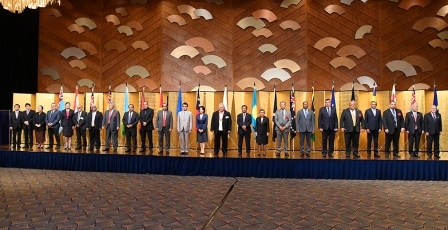
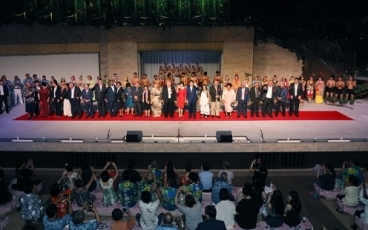 Photo: Cabinet Public Relations Office
Photo: Cabinet Public Relations Office
Independent State of Samoa: Prime Minister and Minister of Foreign Affairs and Trade Tuilaepa Fatialofa Lupesoliai Sailele Malielegaoi
Republic of Palau: President Tommy E. Remengesau, Jr.
Republic of Nauru: President and Minister for Foreign Affairs and Trade Baron Waqa
Federated States of Micronesia: President Peter Martin Christian
Republic of the Marshall Islands: President Hilda C. Heine
Republic of Kiribati: President and Minister of Foreign Affairs and Immigration Taneti Maamau
Republic of Fiji: Prime Minister and Minister of Foreign Affairs Josaia Voreqe Bainimarama
Cook Islands: Prime Minister and Minister of Foreign Affairs and Immigration Henry Puna
Independent State of Papua New Guinea: Prime Minister Peter O'Neill
Tuvalu: Prime Minister and Minister of Public Utilities and Infrastructure Enele Sosene Sopoaga
Republic of Vanuatu: Prime Minister Charlot Salwai Tabimasmas
Solomon Islands: Prime Minister Rick Houenipwela
New Caledonia: President of the government of New Caledonia Philippe Germain
Niue: Acting Premier and Minister for Infrastructure Pokotoa Lalotoa Sipeli
New Zealand: Deputy Prime Minister and Minister of Foreign Affairs Winston Peters
Kingdom of Tonga: Deputy Prime Minister and Minister for Infrastructure and Tourism S?misi Kioa Lafu Sika
Commonwealth of Australia: Minister for International Development and the Pacific Concetta Fierravanti-Wells
French Polynesia: Minister of Culture, the Environment, Arts and Crafts and Energy, responsible for the Promotion of Languages and for Communication of French Polynesia Heremoana Maamaatuiahutapu
Pacific Islands Forum (PIF): Secretary General of the Pacific Islands Forum Meg Taylor
Republic of Palau: President Tommy E. Remengesau, Jr.
Republic of Nauru: President and Minister for Foreign Affairs and Trade Baron Waqa
Federated States of Micronesia: President Peter Martin Christian
Republic of the Marshall Islands: President Hilda C. Heine
Republic of Kiribati: President and Minister of Foreign Affairs and Immigration Taneti Maamau
Republic of Fiji: Prime Minister and Minister of Foreign Affairs Josaia Voreqe Bainimarama
Cook Islands: Prime Minister and Minister of Foreign Affairs and Immigration Henry Puna
Independent State of Papua New Guinea: Prime Minister Peter O'Neill
Tuvalu: Prime Minister and Minister of Public Utilities and Infrastructure Enele Sosene Sopoaga
Republic of Vanuatu: Prime Minister Charlot Salwai Tabimasmas
Solomon Islands: Prime Minister Rick Houenipwela
New Caledonia: President of the government of New Caledonia Philippe Germain
Niue: Acting Premier and Minister for Infrastructure Pokotoa Lalotoa Sipeli
New Zealand: Deputy Prime Minister and Minister of Foreign Affairs Winston Peters
Kingdom of Tonga: Deputy Prime Minister and Minister for Infrastructure and Tourism S?misi Kioa Lafu Sika
Commonwealth of Australia: Minister for International Development and the Pacific Concetta Fierravanti-Wells
French Polynesia: Minister of Culture, the Environment, Arts and Crafts and Energy, responsible for the Promotion of Languages and for Communication of French Polynesia Heremoana Maamaatuiahutapu
Pacific Islands Forum (PIF): Secretary General of the Pacific Islands Forum Meg Taylor

